Unit 12 Life is full of the unexpected 单元知识点复习课件
文档属性
| 名称 | Unit 12 Life is full of the unexpected 单元知识点复习课件 |

|
|
| 格式 | zip | ||
| 文件大小 | 69.0KB | ||
| 资源类型 | 教案 | ||
| 版本资源 | 人教新目标(Go for it)版 | ||
| 科目 | 英语 | ||
| 更新时间 | 2015-11-29 00:00:00 | ||
图片预览

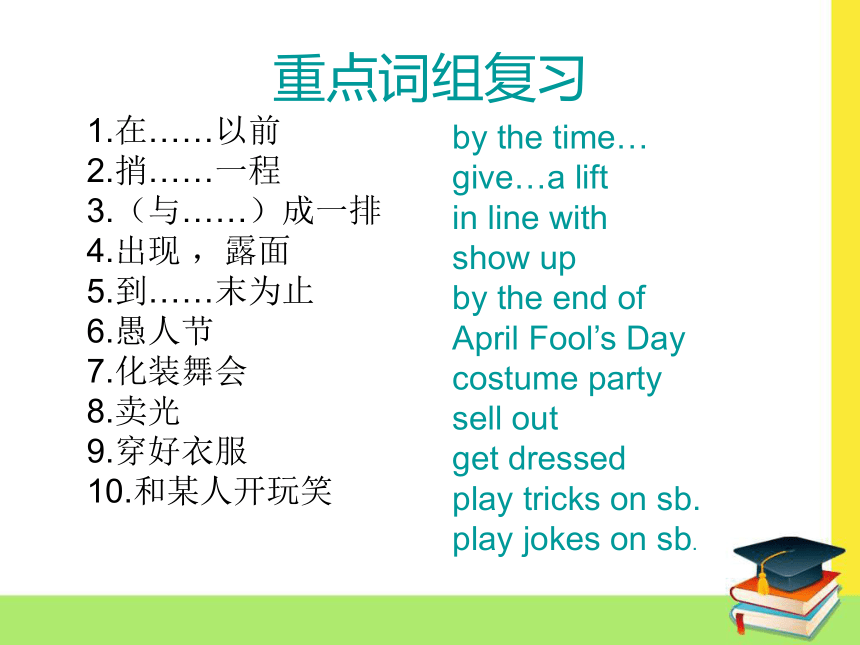
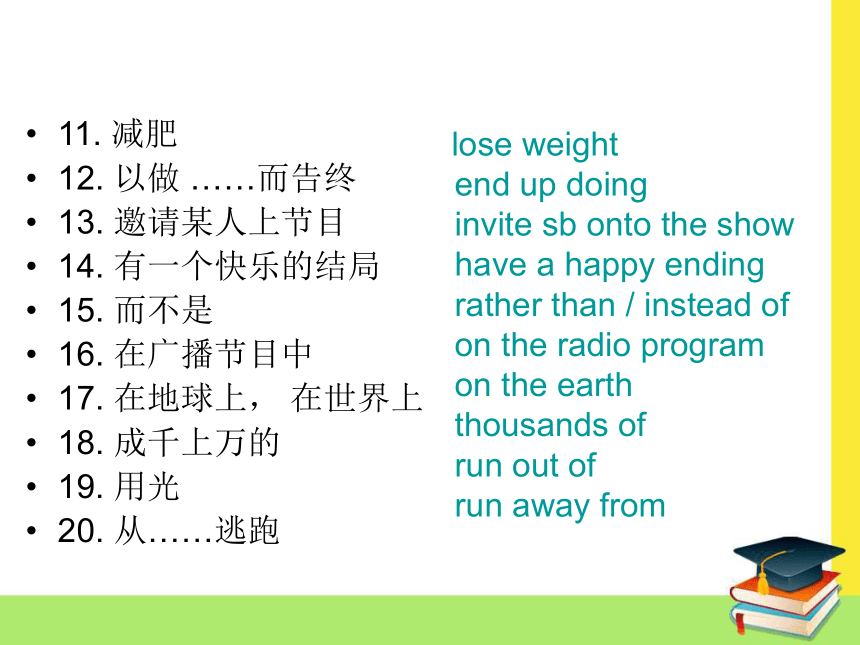

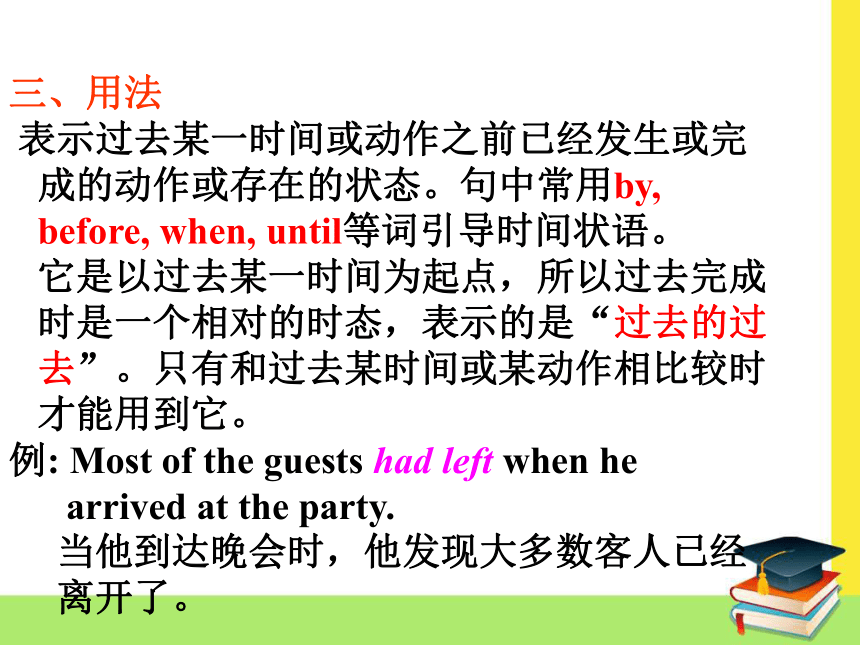
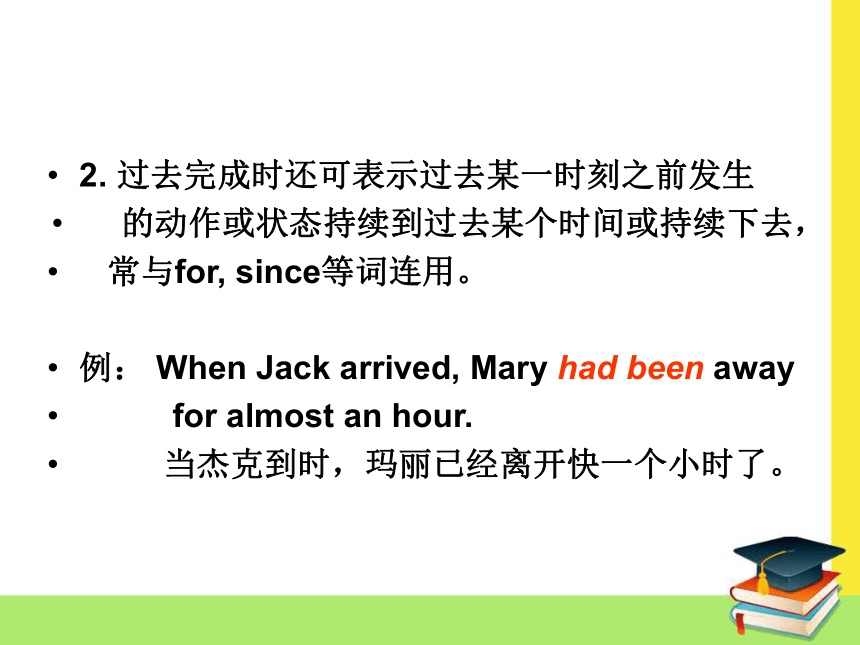

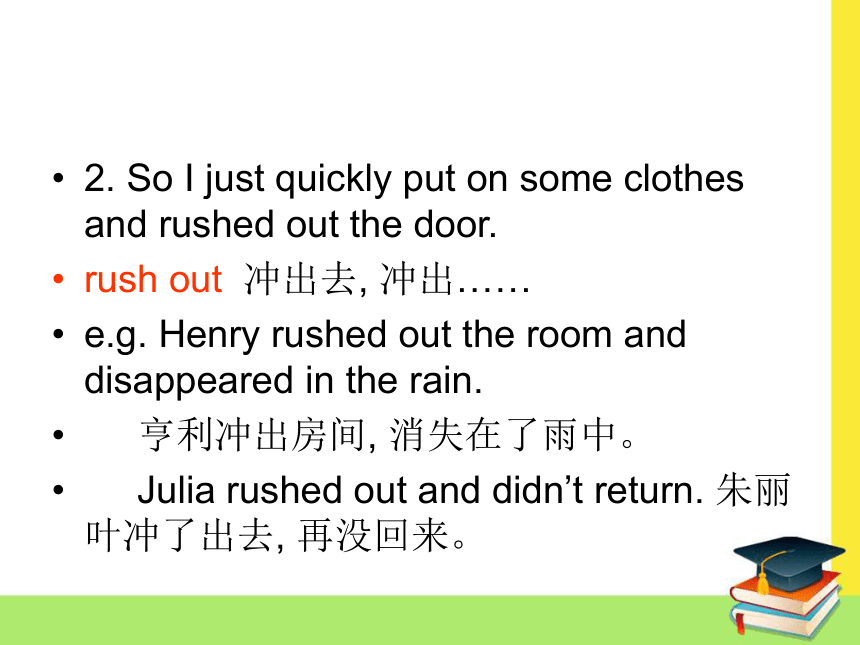
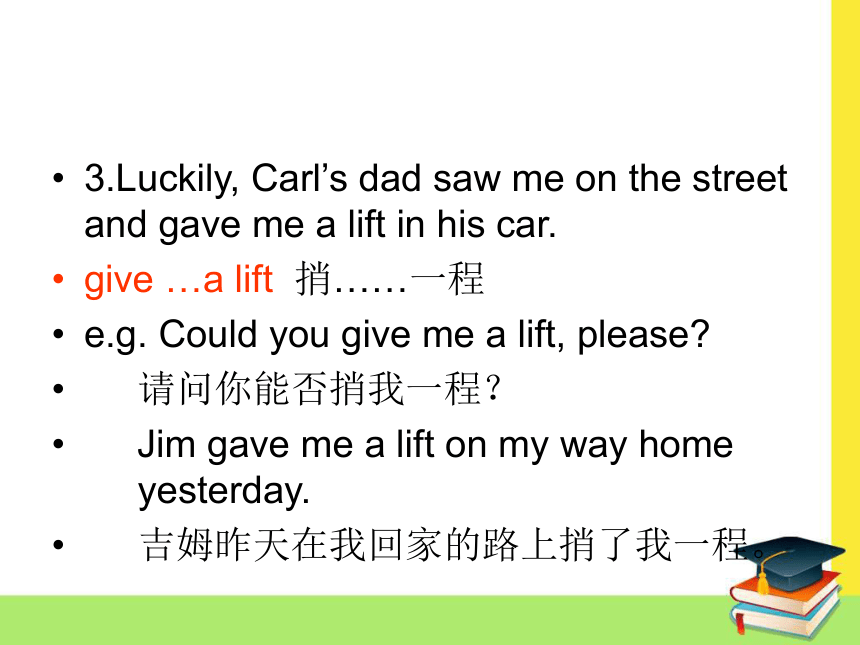
文档简介
课件25张PPT。新目标英语九年级系列复习课件---Unit 121.在……以前
2.捎……一程
3.(与……)成一排
4.出现 ,露面
5.到……末为止
6.愚人节
7.化装舞会
8.卖光
9.穿好衣服
10.和某人开玩笑重点词组复习by the time…
give…a lift
in line with
show up
by the end of
April Fool’s Day
costume party
sell out
get dressed
play tricks on sb.
play jokes on sb.11. 减肥
12. 以做 ……而告终
13. 邀请某人上节目
14. 有一个快乐的结局
15. 而不是
16. 在广播节目中
17. 在地球上, 在世界上
18. 成千上万的
19. 用光
20. 从……逃跑 lose weight
end up doing
invite sb onto the show
have a happy ending
rather than / instead of
on the radio program
on the earth
thousands of
run out of
run away from Grammar Focus过去完成时
一、概念
过去完成时表示一个动作或状态在过去某一
时间或动作之前已经完成或结束,也可能是
早已完成或结束,即“过去的过去”;也可以
指过去的动作延续到过去的某个时刻。
二、结构
“had +动词的过去分词”三、用法
表示过去某一时间或动作之前已经发生或完
成的动作或存在的状态。句中常用by,
before, when, until等词引导时间状语。
它是以过去某一时间为起点,所以过去完成
时是一个相对的时态,表示的是“过去的过
去”。只有和过去某时间或某动作相比较时
才能用到它。
例: Most of the guests had left when he
arrived at the party.
当他到达晚会时,他发现大多数客人已经
离开了。 2. 过去完成时还可表示过去某一时刻之前发生
的动作或状态持续到过去某个时间或持续下去,
常与for, since等词连用。
例: When Jack arrived, Mary had been away
for almost an hour.
当杰克到时,玛丽已经离开快一个小时了。 1. By the time I got up, my brother had already gotten in the shower.
by the time 在……以前,常引导表示过去的时间状语从句,主句常用过去完成时,即had+动词过去分词
e.g. By the time I got there, he had already left.
在我到那儿之前,他已经离开了。Language points2. So I just quickly put on some clothes and rushed out the door.
rush out 冲出去, 冲出……
e.g. Henry rushed out the room and disappeared in the rain.
亨利冲出房间, 消失在了雨中。
Julia rushed out and didn’t return. 朱丽叶冲了出去, 再没回来。3.Luckily, Carl’s dad saw me on the street and gave me a lift in his car.
give …a lift 捎……一程
e.g. Could you give me a lift, please?
请问你能否捎我一程?
Jim gave me a lift on my way home yesterday.
吉姆昨天在我回家的路上捎了我一程。4. I was about to go up when I decided to get a coffee first.
be about to 忙于;即将做某事。侧重于表示动作马上就要发生,常与when引导的从句连用,但不与具体的时间状语连用。
e.g. One of my friends is about to have her second baby.
我的一个朋友马上就要生第二个小孩了。5.I went to my favorite coffee place even though it was two blocks east from my office.
even though 即使, 虽然, 尽管, 用于引导让步状语从句。
block n. 街区
e.g. He’s the best teacher, even though he has the least experience.
他虽然经验最少,却是最好的老师。6. We stared in disbelief at the black smoke rising above the burning building.
stare v. 盯着看, 凝视
表示看得比较仔细,有时候也带有吃惊的意味去看,常与at, into连用。
e.g. Don’t stare at me like that. 别那样盯着我看。
in disbelief 不相信 ,疑惑, 怀疑
e.g. Tamara stared at him in disbelief, shaking her head.
塔玛拉一边狐疑地盯着他看,一边摇着头。
She looked at him in disbelief. 她全然不信地看着他。7.I felt lucky to be alive.
alive 一般作表语;也可以作后置定语或宾补。 “活(着)的;在世的;(继续)存在的”;反义词是dead。
e.g. Do you know she’s alive? 你知道她还活着吗?
People alive should try their best to live better. (后置定语)
活下来的人应该尽力生活得更好。
Tom was kept alive in the big fire.
( 宾补) 汤姆在这次大火中活下来了。
辨析 alive, living, lively
alive “活着的”,在句中常作表语或定语。作表语时,常可与?living互换;作定语时,常要放在被修饰词之后。
living“活着的”,在句中用作表语或定语。
lively“活泼的”,在句中可作表语或定语。8. But by the time I got to the airport, my plane to New Zealand had already taken off.
airport n. 机场
take off 脱掉; 起飞
e.g. He took off his hat and bowed as he passed. 他经过时脱帽鞠躬。
We eventually took off at 11 o’clock and arrived in Venice at 1:30.
我们终于在11点起飞,1:30 到达威尼斯。9.The other kids showed up.
show up 露面,到场;(使)看得见;
e.g. We waited until five o'clock, but he did not show up.
我们一直等到了5点,但是他始终没有露面。10. Many April Fool’s jokes may end up being not very funny.
end up (doing sth.)(以…)结束; 最终成为; 最后处于
e.g. Every time she tried to argue with her husband, she ended up crying her eyes out. 每回她试着和她丈夫争辩,她总是以流泪结束。
end up sth. 表示“结束某事”。
e.g. The scientist ended up his speech at last. 那个科学家最后结束了演讲。
end up with sth. (以…)结束
e.g. The students began with speaking English, but ended up with speaking Chinese.
同学们以说英语开始, 却以说汉语结束。11. above,on,?over的用法?aboveoverona.?above的意思是“在…之上;高于……”,表
示相对高度,不一定是在正上方,它的反
义词是below.?
?例:The?plane?flew?above?the?clouds.
飞机在云层上面飞行。??
b.?over的意思是“在…之上”,表示在垂直之
上,其反义词是under.?
?例:There?is?a?bridge?over?the?river.?
河上有座桥。??????
c. on的意思是“在…上面”,表示与表面接触。
?例:He?put?the?book?on?the?desk.
他把书放在课桌上。一、根据汉语意思完成句子。1. 当我到车站时,火车已经开走了。
??____?____?____?I?got?to?the?station,?the?
train?____?________?left.??
2. 长大后,他会离开这儿。???
He?_____?_____?here?by?the?time?he?______?up.
3. 他捎我去车站。
He?_____?____?____?____?to?the?station.?By the timehad alreadywill leavegrowsgave me a lift Exercises4. 有时,坏事可以变成好事。???
A?bad?thing?can?be?______?_____?a?good?
one?sometimes.
5. 你知道飞机什么时间起飞吗????
Do?you?know?when?the?plane?will?______
______????
6.?房间里全是学生。???
The?room?_____?_____?_____?students.turned intotakeoff is full of二,根据汉语提示写出下面句中所缺的单词。1.?I?got?up?early?this?morning?because?I?didn’t?
want?to?_______?(错过)?the?early?bus.??
2.?The?drop?in?prices?was?quiet?___________
?(出乎意料的).?
3.?The?______?(工人)?fell?down?and?got?hurt.
4.?The?plane?was?flying?_____?(在上面) the
clouds.?
?5.?The?river?goes?through?the?city?from?______?
(西)?to?east.missunexpectedworkerabovewest1. By the end of last month, he _______ in the club for two years.(2013年诸暨 )
A. joined B. has joined
C. has been D. had been
2. ---We all went to the cinema except you last night. Why didn’t you come?
---Because I ______ that movie twice.
(2013年襄阳市 )
A. have watched B. had watched
C. was watching D. would watch中考链接3. Mr Brown always makes his class _________ and keeps his students _________ in class. (2010镇江市)
A. alive; interesting B. lively; interesting
C. alive; interested D. lively; interested
4. — Congratulations! Your English teacher told me you got an A this time. (2010咸宁市)
— Thank you. She is very .
A. impressed B. embarrassed C. terrified D. frustrated5. Another new fiction by HanHan is being printed and it will soon ____. (2010荆门市)
A. come out B. set out
C. sell out D. work out
6. ---Jack, could you help me _____ when the plane will take off on the Internet?
--- I’m sorry. My computer doesn’t work. (2011泰安)
A. get out B. look out
C. take out D. find out Thanks
2.捎……一程
3.(与……)成一排
4.出现 ,露面
5.到……末为止
6.愚人节
7.化装舞会
8.卖光
9.穿好衣服
10.和某人开玩笑重点词组复习by the time…
give…a lift
in line with
show up
by the end of
April Fool’s Day
costume party
sell out
get dressed
play tricks on sb.
play jokes on sb.11. 减肥
12. 以做 ……而告终
13. 邀请某人上节目
14. 有一个快乐的结局
15. 而不是
16. 在广播节目中
17. 在地球上, 在世界上
18. 成千上万的
19. 用光
20. 从……逃跑 lose weight
end up doing
invite sb onto the show
have a happy ending
rather than / instead of
on the radio program
on the earth
thousands of
run out of
run away from Grammar Focus过去完成时
一、概念
过去完成时表示一个动作或状态在过去某一
时间或动作之前已经完成或结束,也可能是
早已完成或结束,即“过去的过去”;也可以
指过去的动作延续到过去的某个时刻。
二、结构
“had +动词的过去分词”三、用法
表示过去某一时间或动作之前已经发生或完
成的动作或存在的状态。句中常用by,
before, when, until等词引导时间状语。
它是以过去某一时间为起点,所以过去完成
时是一个相对的时态,表示的是“过去的过
去”。只有和过去某时间或某动作相比较时
才能用到它。
例: Most of the guests had left when he
arrived at the party.
当他到达晚会时,他发现大多数客人已经
离开了。 2. 过去完成时还可表示过去某一时刻之前发生
的动作或状态持续到过去某个时间或持续下去,
常与for, since等词连用。
例: When Jack arrived, Mary had been away
for almost an hour.
当杰克到时,玛丽已经离开快一个小时了。 1. By the time I got up, my brother had already gotten in the shower.
by the time 在……以前,常引导表示过去的时间状语从句,主句常用过去完成时,即had+动词过去分词
e.g. By the time I got there, he had already left.
在我到那儿之前,他已经离开了。Language points2. So I just quickly put on some clothes and rushed out the door.
rush out 冲出去, 冲出……
e.g. Henry rushed out the room and disappeared in the rain.
亨利冲出房间, 消失在了雨中。
Julia rushed out and didn’t return. 朱丽叶冲了出去, 再没回来。3.Luckily, Carl’s dad saw me on the street and gave me a lift in his car.
give …a lift 捎……一程
e.g. Could you give me a lift, please?
请问你能否捎我一程?
Jim gave me a lift on my way home yesterday.
吉姆昨天在我回家的路上捎了我一程。4. I was about to go up when I decided to get a coffee first.
be about to 忙于;即将做某事。侧重于表示动作马上就要发生,常与when引导的从句连用,但不与具体的时间状语连用。
e.g. One of my friends is about to have her second baby.
我的一个朋友马上就要生第二个小孩了。5.I went to my favorite coffee place even though it was two blocks east from my office.
even though 即使, 虽然, 尽管, 用于引导让步状语从句。
block n. 街区
e.g. He’s the best teacher, even though he has the least experience.
他虽然经验最少,却是最好的老师。6. We stared in disbelief at the black smoke rising above the burning building.
stare v. 盯着看, 凝视
表示看得比较仔细,有时候也带有吃惊的意味去看,常与at, into连用。
e.g. Don’t stare at me like that. 别那样盯着我看。
in disbelief 不相信 ,疑惑, 怀疑
e.g. Tamara stared at him in disbelief, shaking her head.
塔玛拉一边狐疑地盯着他看,一边摇着头。
She looked at him in disbelief. 她全然不信地看着他。7.I felt lucky to be alive.
alive 一般作表语;也可以作后置定语或宾补。 “活(着)的;在世的;(继续)存在的”;反义词是dead。
e.g. Do you know she’s alive? 你知道她还活着吗?
People alive should try their best to live better. (后置定语)
活下来的人应该尽力生活得更好。
Tom was kept alive in the big fire.
( 宾补) 汤姆在这次大火中活下来了。
辨析 alive, living, lively
alive “活着的”,在句中常作表语或定语。作表语时,常可与?living互换;作定语时,常要放在被修饰词之后。
living“活着的”,在句中用作表语或定语。
lively“活泼的”,在句中可作表语或定语。8. But by the time I got to the airport, my plane to New Zealand had already taken off.
airport n. 机场
take off 脱掉; 起飞
e.g. He took off his hat and bowed as he passed. 他经过时脱帽鞠躬。
We eventually took off at 11 o’clock and arrived in Venice at 1:30.
我们终于在11点起飞,1:30 到达威尼斯。9.The other kids showed up.
show up 露面,到场;(使)看得见;
e.g. We waited until five o'clock, but he did not show up.
我们一直等到了5点,但是他始终没有露面。10. Many April Fool’s jokes may end up being not very funny.
end up (doing sth.)(以…)结束; 最终成为; 最后处于
e.g. Every time she tried to argue with her husband, she ended up crying her eyes out. 每回她试着和她丈夫争辩,她总是以流泪结束。
end up sth. 表示“结束某事”。
e.g. The scientist ended up his speech at last. 那个科学家最后结束了演讲。
end up with sth. (以…)结束
e.g. The students began with speaking English, but ended up with speaking Chinese.
同学们以说英语开始, 却以说汉语结束。11. above,on,?over的用法?aboveoverona.?above的意思是“在…之上;高于……”,表
示相对高度,不一定是在正上方,它的反
义词是below.?
?例:The?plane?flew?above?the?clouds.
飞机在云层上面飞行。??
b.?over的意思是“在…之上”,表示在垂直之
上,其反义词是under.?
?例:There?is?a?bridge?over?the?river.?
河上有座桥。??????
c. on的意思是“在…上面”,表示与表面接触。
?例:He?put?the?book?on?the?desk.
他把书放在课桌上。一、根据汉语意思完成句子。1. 当我到车站时,火车已经开走了。
??____?____?____?I?got?to?the?station,?the?
train?____?________?left.??
2. 长大后,他会离开这儿。???
He?_____?_____?here?by?the?time?he?______?up.
3. 他捎我去车站。
He?_____?____?____?____?to?the?station.?By the timehad alreadywill leavegrowsgave me a lift Exercises4. 有时,坏事可以变成好事。???
A?bad?thing?can?be?______?_____?a?good?
one?sometimes.
5. 你知道飞机什么时间起飞吗????
Do?you?know?when?the?plane?will?______
______????
6.?房间里全是学生。???
The?room?_____?_____?_____?students.turned intotakeoff is full of二,根据汉语提示写出下面句中所缺的单词。1.?I?got?up?early?this?morning?because?I?didn’t?
want?to?_______?(错过)?the?early?bus.??
2.?The?drop?in?prices?was?quiet?___________
?(出乎意料的).?
3.?The?______?(工人)?fell?down?and?got?hurt.
4.?The?plane?was?flying?_____?(在上面) the
clouds.?
?5.?The?river?goes?through?the?city?from?______?
(西)?to?east.missunexpectedworkerabovewest1. By the end of last month, he _______ in the club for two years.(2013年诸暨 )
A. joined B. has joined
C. has been D. had been
2. ---We all went to the cinema except you last night. Why didn’t you come?
---Because I ______ that movie twice.
(2013年襄阳市 )
A. have watched B. had watched
C. was watching D. would watch中考链接3. Mr Brown always makes his class _________ and keeps his students _________ in class. (2010镇江市)
A. alive; interesting B. lively; interesting
C. alive; interested D. lively; interested
4. — Congratulations! Your English teacher told me you got an A this time. (2010咸宁市)
— Thank you. She is very .
A. impressed B. embarrassed C. terrified D. frustrated5. Another new fiction by HanHan is being printed and it will soon ____. (2010荆门市)
A. come out B. set out
C. sell out D. work out
6. ---Jack, could you help me _____ when the plane will take off on the Internet?
--- I’m sorry. My computer doesn’t work. (2011泰安)
A. get out B. look out
C. take out D. find out Thanks
同课章节目录
- Unit 1 How can we become good learners.
- Section A
- Section B
- Unit 2 I think that mooncakes are delicious!
- Section A
- Section B
- Unit 3 Could you please tell me where the restroom
- Section A
- Section B
- Unit 4 I used to be afraid of the dark.
- Section A
- Section B
- Unit 5 What are the shirts made of?
- Section A
- Section B
- Review of Units 1-5
- Unit 6 When was it invented?
- Section A
- Section B
- Unit 7 Teenagers should be allowed to choose their
- Section A
- Section B
- Unit 8 It must belong to Carla.
- Section A
- Section B
- Unit 9 I like music that I can dance to.
- Section A
- Section B
- Unit 10 You're supposed to shake hands.
- Section A
- Section B
- Review of Units 6-10
- Unit 11 Sad movies make me cry.
- Section A
- Section B
- Unit 12 Life is full of the unexpected
- Section A
- Section B
- Unit 13 We're trying to save the earth!
- Section A
- Section B
- Unit 14 I remember meeting all of you in Grade 7.
- Section A
- Section B
- Review of Units 11-14
